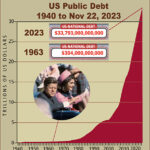I just watched this video. It’s from the channel, Learn Liberty, on YouTube. I don’t know anything about them but the title sucked me in.
Why Government Fails
I started watching it and found it very well done. It’s a very logical and methodical approach to understanding socioeconomic design, and the private versus public paradigm competing for our political beliefs, our ideological allegiance, and ultimately our votes.
This is of the highest grade propaganda. It’s a solid 99% right on the money. It’s all very persuasive except the conclusion. And he lets you draw the conclusion yourself, which makes this propaganda extra-primo caliber disinformation brought to you by those that professionally rationalize their own economic privileges, for money.
Be careful what you wish for the professor says. He is implying that you don’t want the government doing stuff for you because they have no incentive to help you compared to the private sector. Profit motives will insure your customer satisfaction, he says.
It is a lock-tight argument for changing the government to be more helpful, accessible, and user friendly. The problem is the professor is not doing that. He is actually making an argument against “socialized” healthcare and against using the government to provide the public services necessary for the common good, without saying as much.
HIs argument, all of which is very good, supports a fraudulent conclusion, which is the private sector is the better choice, ignoring the fact that the government could be redesigned to make the public sector accommodate the needs of its citizens.
We need to fix the government, not privatize it. Like most of these “liberty” wankers, the professor is wrong. His free-market advocation is really an argument to perpetuate the scam, profiting some by exploiting others.
A political solution for the public would be to fix the government, not privatize it to benefit those who can afford it.



